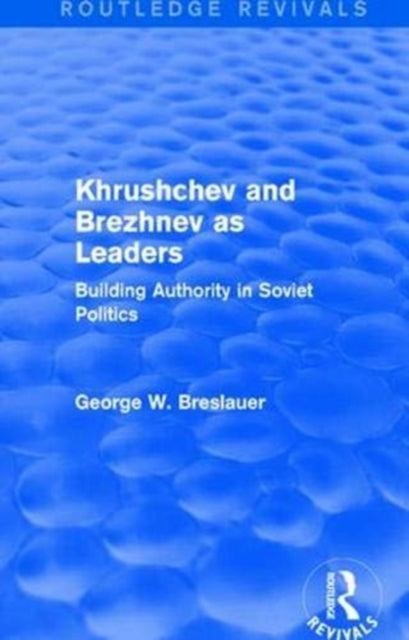George W. Breslauer
Khrushchev and Brezhnev as Leaders: Building Authority in Soviet Politics
Khrushchev and Brezhnev as Leaders: Building Authority in Soviet Politics
YOU SAVE £1.68
- Condition: Brand new
- UK Delivery times: Usually arrives within 2 - 3 working days
- UK Shipping: Fee starts at £2.39. Subject to product weight & dimension
Bulk ordering. Want 15 or more copies? Get a personalised quote and bigger discounts. Learn more about bulk orders.
Couldn't load pickup availability
- More about Khrushchev and Brezhnev as Leaders: Building Authority in Soviet Politics
This book explores how Khrushchev and Brezhnev manipulated their policies and personal images to consolidate their authority as leaders, examining Soviet domestic politics and rejecting conventional images.
Format: Paperback / softback
Length: 318 pages
Publication date: 31 March 2021
Publisher: Taylor & Francis Ltd
First published in 1982, this book delves into the intricate strategies employed by Khrushchev and Brezhnev to solidify their authority as leaders of the Soviet Union. It examines the central themes of Soviet domestic politics, including investment priorities, incentive policies, administrative reform, and political participation. The author challenges the prevailing notions that portray Khrushchev as a mere consumer advocate and decentralizer and Brezhnev's leadership as dull and conservative. Instead, he offers a fresh perspective by exploring how these leaders navigated the challenging task of crafting programs that harmonized the aspirations of the post-Stalin elites for consumer satisfaction and expanded political participation with the enduring Soviet values.
Investment Priorities:
Khrushchev and Brezhnev faced the daunting challenge of allocating resources in a rapidly changing economic landscape. They recognized the importance of investing in infrastructure and technological advancements to stimulate growth and improve the standard of living for the Soviet population. However, their approaches to investment differed. Khrushchev advocated for a more decentralized approach, encouraging local initiatives and prioritizing sectors such as agriculture and consumer goods. On the other hand, Brezhnev favored a centralized approach, implementing ambitious state-led projects in industries like steel and energy.
Incentive Policy:
Another critical aspect of Soviet domestic politics was the implementation of incentive policies to motivate workers and increase productivity. Khrushchev introduced the concept of "socialism with a human face," emphasizing the importance of consumer satisfaction and social welfare. He implemented policies such as wage increases, housing subsidies, and free healthcare to improve the living conditions of Soviet citizens. Brezhnev, on the other hand, took a more conservative approach, focusing on economic efficiency and strict control over the workforce. He implemented policies such as labor camps and forced industrialization to achieve his goals.
Administrative Reform:
Khrushchev and Brezhnev also initiated administrative reform to streamline the Soviet government and improve its efficiency. They recognized the need for a more accountable and transparent system to address the concerns of the Soviet people. Khrushchev implemented policies such as de-Stalinization, which aimed to remove the remnants of Stalin's authoritarian regime and promote democratic values. Brezhnev, on the other hand, focused on consolidating power and centralizing control in the hands of the Communist Party.
Political Participation:
Khrushchev and Brezhnev recognized the importance of political participation and the need to engage the Soviet people in the decision-making process. They implemented policies to promote political participation, including the creation of grassroots organizations and the expansion of civil rights. Khrushchev also initiated the policy of glasnost, which allowed for greater freedom of expression and the press. Brezhnev, on the other hand, maintained a strict control over political discourse and limited the freedom of assembly and association.
Conclusion:
In conclusion, this book provides a valuable insight into the complex dynamics of Soviet domestic politics during the Khrushchev and Brezhnev era. It challenges the conventional narratives and offers a fresh perspective on the leaders' strategies and tactics. By examining investment priorities, incentive policies, administrative reform, and political participation, the author sheds light on the challenges and opportunities faced by Khrushchev and Brezhnev as they attempted to consolidate their authority and shape the future of the Soviet Union. This book is a must-read for anyone interested in understanding the history and politics of the Cold War era.
Weight: 412g
Dimension: 138 x 214 x 24 (mm)
ISBN-13: 9781138686717
This item can be found in:
UK and International shipping information
UK and International shipping information
UK Delivery and returns information:
- Delivery within 2 - 3 days when ordering in the UK.
- Shipping fee for UK customers from £2.39. Fully tracked shipping service available.
- Returns policy: Return within 30 days of receipt for full refund.
International deliveries:
Shulph Ink now ships to Australia, Belgium, Canada, France, Germany, Ireland, Italy, India, Luxembourg Saudi Arabia, Singapore, Spain, Netherlands, New Zealand, United Arab Emirates, United States of America.
- Delivery times: within 5 - 10 days for international orders.
- Shipping fee: charges vary for overseas orders. Only tracked services are available for most international orders. Some countries have untracked shipping options.
- Customs charges: If ordering to addresses outside the United Kingdom, you may or may not incur additional customs and duties fees during local delivery.


